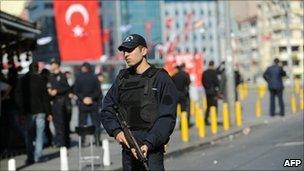Kurdish militants say they carried out Istanbul bombing
- Published

The main Kurdish rebel group the PKK have denied any connection to Sunday's bombing
A radical Kurdish group has claimed responsibility for a suicide bombing in central Istanbul on Sunday that injured 32 people, including 15 police.
The Kurdistan Freedom Falcons (Tak) said on its website it had mounted the attack at a police point in Istanbul's Taksim Square as a "act of revenge".
The attack targeted "the police force of Turkish fascism", the group said.
The group operates in Turkish cities and has claimed several deadly bombings in past years.
Sunday's explosion took place right next to the independence monument on Taksim Square, which is frequently crowded with people.
Police identified other bombs nearby and disabled them.
PKK denial
Authorities had named the suicide bomber on Tuesday, saying he came from a mainly Kurdish province and was a known member of a "separatist terrorist organisation", a term often used to describe the Kurdish separatist PKK party.
But the PKK has denied any responsibility for Sunday's attack.
On Monday it extended a one-sided ceasefire which had run out late on Sunday until next year's elections. It has also said it will no longer target civilians.
In its statement on Thursday, Tak made it clear it disagreed with the truce and would not observe it.
"We have seen no development that would justify the silencing of Tak weapons and we maintain our position on that," it said, according to AFP news agency.
It warned "all forces [of oppression of the Kurds]" that "sooner or later they will become the target of Tak's suicide commandos."
The PKK says the Tak is a splinter group outside its control, but the Turkish government says the Tak is merely a front for the PKK.
The Turkish government has been exploring ways to solve the Kurdish conflict, and officials have been talking to the imprisoned PKK leader Abdullah Ocalan.
The PKK launched its guerrilla campaign in 1984 for an ethnic homeland in the Kurdish heartland in the south-east. It has spawned several splinter groups.
- Published31 October 2010
- Published1 November 2010